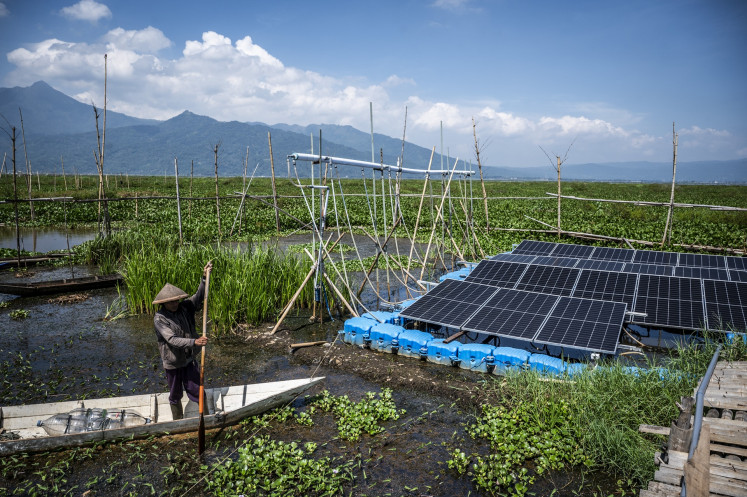Popular Reads
Top Results
Can't find what you're looking for?
View all search resultsPopular Reads
Top Results
Can't find what you're looking for?
View all search resultsGeopolitical strife and commodity volatility: Inflation impact?
Given the latest tensions between Iran and Israel, the rupiah could be lower in value for longer, potentially threatening our economy through higher imported inflation.
Change text size
Gift Premium Articles
to Anyone
T
he world has once again witnessed rising geopolitical conflict this year. A clash between Iran and Israel broke out as Iran launched a massive aerial attack on Israel in response to a previous deadly Israeli strike on an Iranian consulate in Syria that killed at least 13 people. As a result, the price of Brent crude oil experienced significant fluctuations, reaching US$89.55 per barrel at the close of trading on Monday. This represents a year-to-date (ytd) increase of 17.2 percent, nearly touching 2022’s peak of $92.31 per barrel during the ongoing Russia-Ukraine war.
Consequently, this year, global logistics costs are seen to escalate amid higher oil prices and disrupted shipping routes. The price of gold and the United States dollar have also increased as investors flee to safe-haven assets amid increased uncertainty.
This will certainly have an impact on the domestic financial market. The rupiah is already under pressure from persistently high US inflation, which has led to widespread expectations that the US Federal Reserve will not immediately implement a rate cut. Given the latest tensions between Iran and Israel, the rupiah could be lower in value for longer, potentially threatening our economy through higher imported inflation. The rising global oil prices could also directly impact domestic inflation through potentially higher fuel oil (BBM) costs.
The global oil price has surpassed the government's assumed price for 2024, which was only $82 per barrel. If the price remains persistently above this assumption, there will be risks of escalated subsidized domestic fuel prices. Based on our calculations, every 1 percent increase in world crude oil prices above the government's assumptions will cause a 0.27 percentage point increase in the price of Pertalite per liter if the government does not roll out any subsidies or compensation. Hence, to prevent the rise in subsidized fuel oil prices, fiscal policy will play a crucial role. Energy subsidies need to be implemented wisely, especially considering that in mid-March, the government had a fiscal surplus of 0.10 percent of gross domestic product (GDP), lower than the surplus in the same period last year of 0.59 percent of GDP.
On April 1, Statistics Indonesia (BPS) announced that Indonesia's inflation had increased to 3.05 percent year-on-year during March 2024, higher than the previous month's inflation rate of 2.75 percent year-on-year. Meanwhile, on a monthly basis, the country’s inflation was recorded at 0.52 percent month-on-month, which is also significantly higher than the 0.37 percent recorded in February. Several factors contributed to this increase in inflation, one of which was the seasonal factor, where overall prices tended to rise during Ramadan, especially for food commodities such as chicken, beef and other staples like rice. Compared to seasonal patterns in previous years, inflation in March was still relatively moderate. Based on our database, inflation preceding the Idul Fitri celebrations usually ranged from 0.7 percent to 0.9 percent month-on-month from 2010 to 2019. However, the inflation rate in March almost reached the upper inflation limit of 3.5 percent set by Bank Indonesia (BI) for this year.
The persistent increase in inflation seems to have begun to impact public consumption, particularly among the lower-middle class. Our Mandiri Spending Index indicates that spending among the lower income group is slowing down faster than among other groups (middle and upper income), possibly due to the relatively high prices of staple foods, including rice. Considering that El Niño is expected to subside only in May to July 2024, the government's role once again remains crucial in providing assistance to the lower-middle class in the form of social assistance or food aid. Fortunately, the government has allocated a higher budget for holiday allowances (THR) compared to the previous year, which stimulated public consumption during the month of Ramadan. For this year, the government budgeted Rp 38.9 trillion ($2.39 billion) for THR, marking a 13.4 percent increase from the Rp 34.3 trillion allocated in 2023. In accordance with this increase, data from the Mandiri Institute shows that aggregate public spending patterns during Ramadan this year have increased by 6.5 percent compared to the pre-Ramadan period, surpassing the 5.4 percent increase observed in 2023. However, it is undeniable that the high prices of staple foods still have implications for the lower class.
Amid many gloomy outlooks, there are still potential positive catalysts for domestic inflation. The price of rice has shown flattening growth, supported by the fulfillment of rice supplies through imports and improving domestic production amid the easing of El Niño. The Meteorology, Climatology and Geophysics Agency (BMKG) predicts that El Niño will become neutral from May to July 2024. Looking ahead, the government needs to ensure that inflation is maintained within BI's target range to preserve people's purchasing power. To achieve this, the government plans to implement various measures, including the realization of rice import quotas, stabilization of food supply and prices (SPHP) and the provision of subsidies and fertilizer discounts to maintain food availability. Rice imports in 2024 may reach 4.1 million tonnes to ensure stock availability, with SPHP rice distribution capped at a maximum of 200,000 tonnes per month until March 2024. Additionally, fertilizer subsidies totaling Rp 14 trillion will be allocated for a total of 9.55 million tonnes of fertilizer in 2024, along with preparations to provide a 40 percent discount for non-subsidized fertilizer
Overall, we expect Indonesia’s inflation to reach around 3.2 percent year-on-year by the end of 2024 with some upward bias, compared to the 2.61 percent year-on-year realization in 2023.
---
The writer is an economist at Bank Mandiri.










